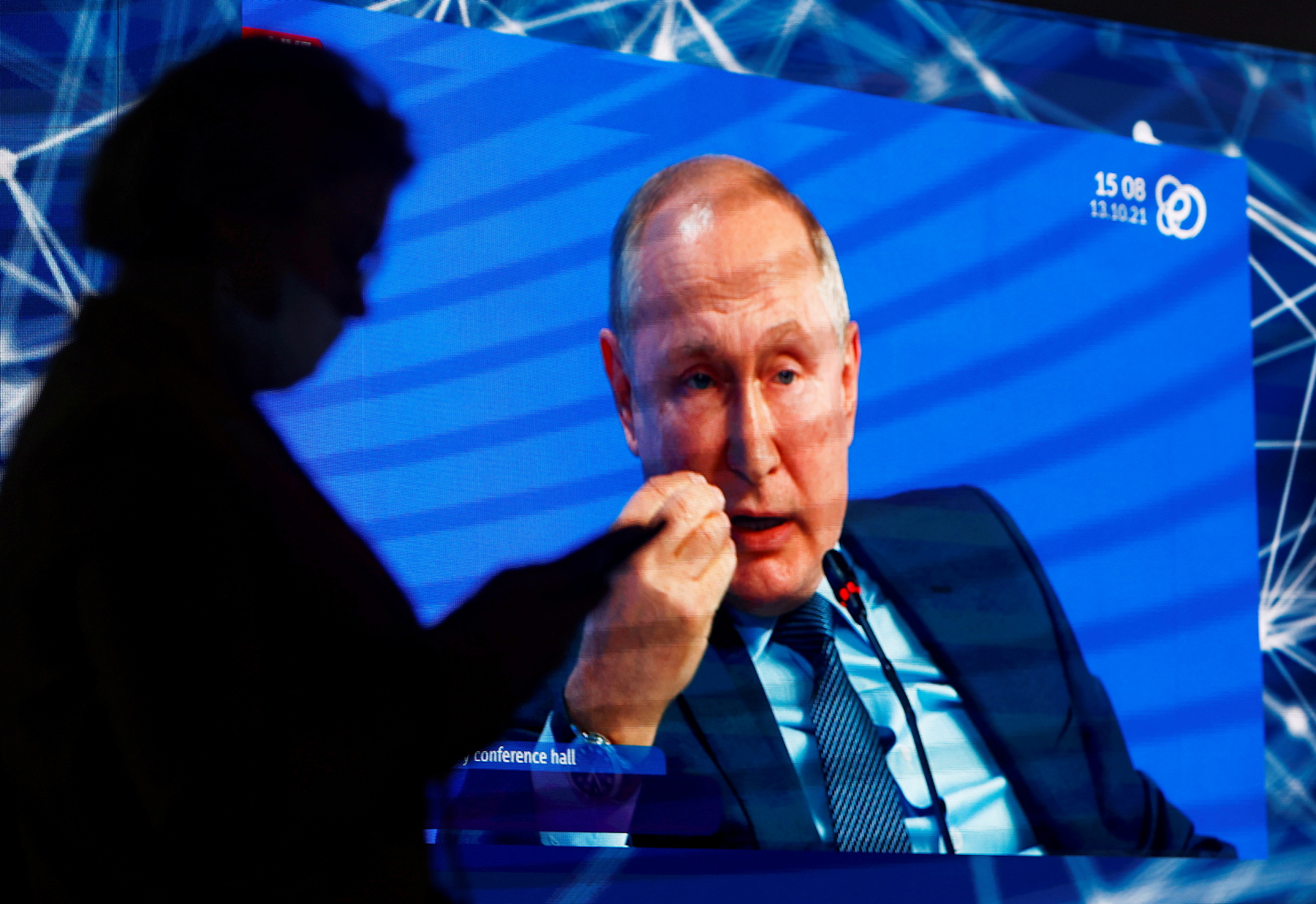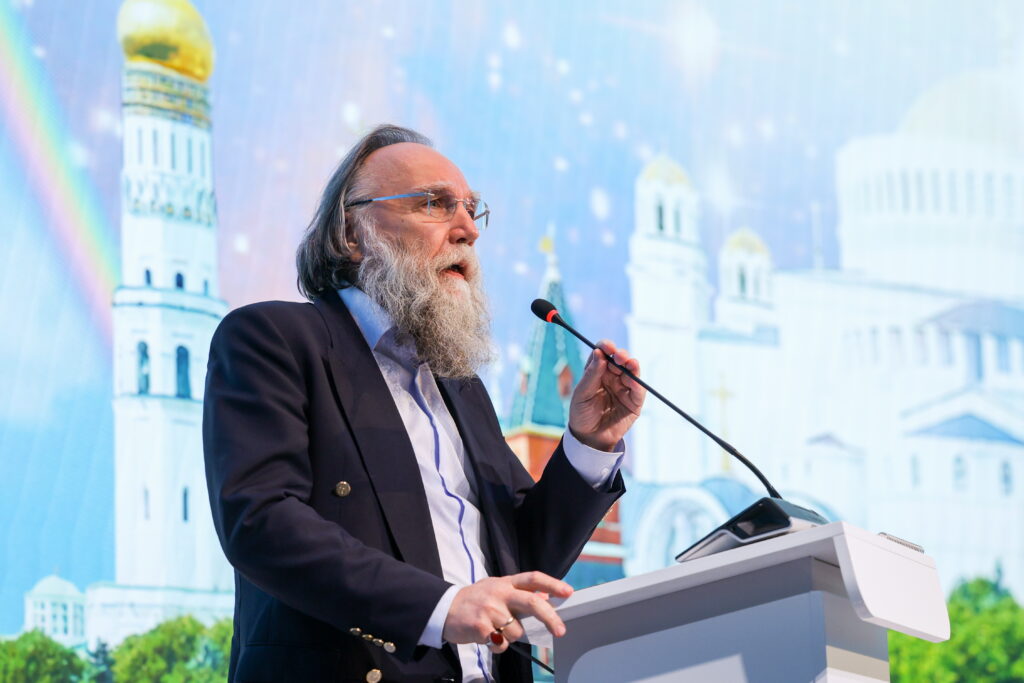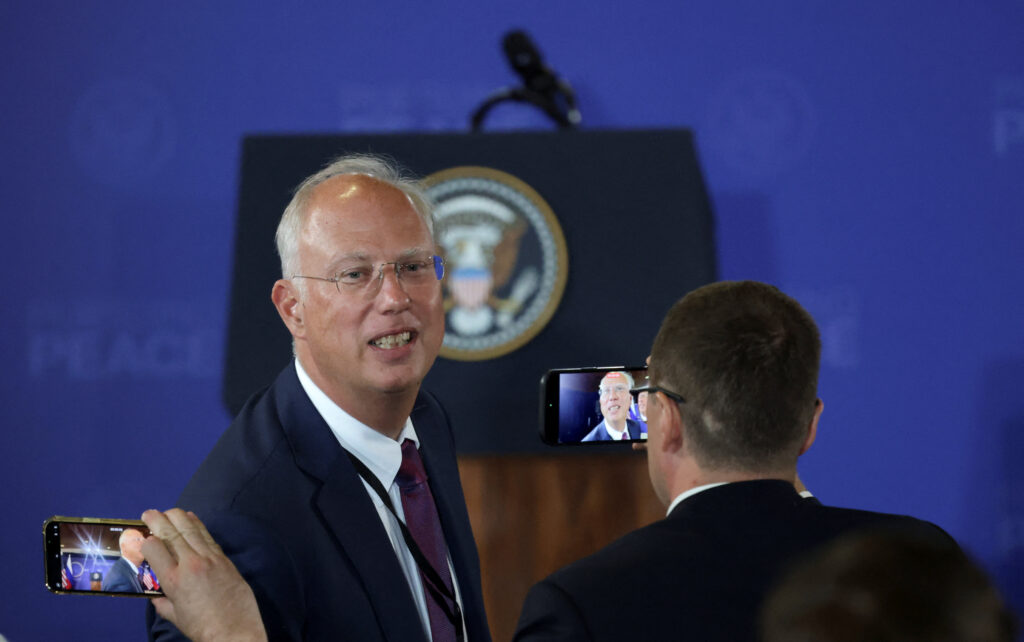The sociologist Norman Fairclough wrote: ‘Such disputes are sometimes seen as merely preliminaries to or outgrowths from the real processes and practices of politics. What I am suggesting is that they are not: they are politics.’
Vladimir Putin apparently realised this long ago and has been very successful at such disputes. In fact, one could write a textbook on his speeches titled The Language of a Successful Dictator: How to Remain Popular Without Ending Repressions.
And one of the Russian president’s most effective discursive tools is his model of argumentation.
In essence, every politician’s goal is to justify the need for proposed solutions. Different speakers use different argumentation schemes which reveal not only the true policy but also the values behind it.
Putin in recent years has relied predominantly on three key argumentation schemes: humanism, responsibility and unity. However, it would be too simple and too mundane to use these words as they are defined by Dahl’s dictionary. To paraphrase a famous saying, the best tactic to prevent true civic unity and avoid taking responsibility oneself is to build these concepts into one’s discourse and adapt them to one’s goals. Let us look at how Putin’s argumentation has evolved.
In general, Putin’s repertoire of argumentation schemes is quite extensive. But before his third presidential term, he used mostly universal types of arguments that draw on the values of development, threats and the common good. That is characteristic of any political discourse. After 2012, his arguments become more diverse and more targeted, although some of his earlier schemes disappear (for example, arguments appealing to the importance of democracy and human rights). And gradually, by 2014, his basic formula of argumentation takes shape: humanism, responsibility, unity.
The argumentation scheme appealing to humanism (humanitarian mission) is based on the principle of the value of human life. In this case the line of argumentation is built according to the following construct: ‘if any political action is aimed at preventing or ending human suffering, then it must be done’.
This model of argumentation is marked mainly by expressions describing torture, deprivation and human suffering. The speaker often uses the words protect, defend, shield, help, rescue, ensure safety, and his position is presented as lending assistance, carrying out a humanitarian mission, protecting people.
In Putin’s statements, this model of argumentation is mainly used to justify foreign policy actions, primarily in Ukraine and Syria.
For example, at a press conference on 4 March 2014, Russia’s possible actions in Ukraine were presented as follows:
‘Let me reiterate: we believe that even if we decide, if I decide to use the Armed Forces, it will be legitimate, fully consistent with … our commitments, in this case consistent with our interests to protect those people that we believe are closely associated with us … It is consistent with our national interests to protect those people. And this is a humanitarian mission. We do not seek to enslave anyone, to impose anything on anyone. But, of course, we cannot turn a blind eye to them being persecuted, annihilated, abused. We would very much like it not to come to that.’
This line of argumentation has a rather strong emotional charge. The colourful, artistic description of human suffering makes it possible to divert the audience’s attention from facts, references to violations of legal norms and other factual arguments. For example, if we compare the argumentation strategies of Western politicians with Putin’s on the Ukraine conflict, references to the fact that Russia’s actions violated international norms certainly lose out, in the eyes of the Russian audience, in comparison with the fact that these actions, in the first place, saved people.
When a speaker refers directly to people’s suffering and misery, it is clear and understandable to anyone regardless of the cultural or political context.
The responsibility argumentation scheme is based on the social value and importance of a quality such as a responsible attitude to business, to people. The formula is as follows: ‘Since the state or a certain social group is responsible to someone, it should act in a certain way’.
The responsibility scheme was used most often both to justify Russia’s actions in the international arena and to support the domestic political decisions of the head of state.
For example, it has been argued that Russia is participating in the Syrian conflict because it is ‘a responsible power’, and it must make ‘responsible decisions’, which are the only way to prevent ‘further erosion of the foundations of the world order, the triumph of the law of force, club law, the multiplication of chaos’. Therefore, Russia’s involvement in Syria is presented as inevitable, as the only possible decision of a responsible power.
Interestingly, the gradual disappearance of references to democracy from Putin’s speeches and the increased frequency of references to the theme of unity correlate with the emergence of an argumentation scheme of responsibility. The correlation is not accidental.
The argumentative models of accountability and democracy are to some extent interchangeable. When a speaker argues that their actions are democratic, they are emphasising that they are following the will of the people. But at the same time, the significance of democratic procedures is brought to the forefront.
Arguing that their actions are responsible, the speaker also shows that they can be trusted, they can be relied on, because they will do everything possible to safeguard the good of the people. But in this case, a certain positive characteristic of power — responsibility — comes to the fore. And the observance of any democratic procedures becomes unimportant.
Or, when it comes to the responsibility of the population, the emphasis is placed on the duties of citizens to the state rather than on the sovereign nature of the people as the source of power.
For example, this 2016 statement presents responsibility as one of the ‘traits of our culture’, as one of the qualities that ‘Russian society values’, along with morality, concern for public interests and a willingness to hear others and respect their opinions.
The president later on refers once again to the subject of the population’s responsibility, stressing that the future of the country depends on citizens’ responsibility. And by ‘responsible’ actions, we mean support for the president’s policies.
At the same time, the social groups that oppose the president’s course are initially presented in a negative light, as irresponsible and unconcerned about the country’s future.
The argumentation scheme around (popular) unity is based on the representation of unity and consolidation as the main condition for success. Argumentation in this case is based on the following idea: ‘We will achieve something good if we are united’. A variant is possible: ‘It is necessary to perform a certain action because it will unite the people/us’.
In a 2014 statement, the state and society ‘being on the same page’ is presented as a guarantee of success: ‘Everyone who is ready to take responsibility should be involved in the implementation of development plans of the country, individual regions and municipalities. If the state and society are on the same page, hand in hand in an atmosphere of cooperation and trust, this is a guarantee of success.’
Accordingly, it is implied that if society is not united with the state and its policies, there will be no success. With this argumentation, the proposed political course appears as the only possible adequate development path.
The idea of ‘people’s unity’ occupies a central place in Putin’s presidential discourse and chosen political course.
But during the first years of his presidency, Putin did not often apply this model of argumentation. It is only since 2013 that he has significantly increased his appeals to unity in his argumentation.
Between 2000 and 2004, the argument for unity was used most frequently when discussing ‘civil society’ and ‘greatpowerness’, since the demand for unity was primarily aimed at civil society and all ‘intellectual forces.’ And Russia’s greatness (‘a great power’) was named as the main goal for which unity was necessary.
Since 2012, the unity argumentation scheme has most often overlapped with the themes of ‘patriotism’ and ‘values’, and sometimes with the themes of ‘sovereignty’, ‘a strong state’, ‘being a great power’ and ‘identity’. The strengthening of rhetoric about a ‘strong, sovereign state’ and ‘identity’ combined with the argumentation for unity was largely related to the events in Ukraine in 2013 and Russia’s annexation of Crimea in March 2014.
Apparently, this model of argumentation allows us to present political decisions or actions as having been made in unity, i.e. jointly by the authorities and the people. Thus, the responsibility for the consequences of actions in need of legitimation is transferred to society as a whole.
In addition, ‘unity’ adds a heroic connotation to the political actions that it is used to justify, because it describes them as very complex but extremely important for the development of the entire state, sometimes having literally historical significance. Furthermore, in presenting unity as a trait historically inherent in the Russian people, such argumentation takes on a positive emotional charge and an emotional connection to previous collective experience. At the same time, the emotional message in the speech allows the speaker to divert the audience’s attention from facts and rational counterarguments.
Moreover, unity may well replace the concept of democracy in cases where there are no formal grounds for using the latter. That is, when the people have not expressed their opinion through democratic procedures — elections or a referendum — about a political decision that requires legitimisation, we can simply declare that the people and the authorities are united on this matter. Then it is quite logical that no elections are necessary.
The described triad of reasoning, humanism-responsibility-unity, allows the speaker to get rid of uncomfortable concepts, such as democracy, human rights, etc., without causing any indignation on the part of the overwhelming majority of the population. Instead, an appealing alternative is offered which presents any restrictive or repressive actions as desired by the people, and the authoritarian leader as a responsible person who cares primarily about the people rather than abstract norms of international law. However, if one decodes the hidden meanings behind all these schemes, the real objectives of the current policy become clear.









